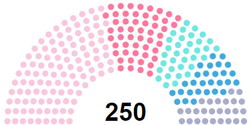Tate-Shōsū (Sparkalia): Difference between revisions
| Line 96: | Line 96: | ||
==Factions== | ==Factions== | ||
Although formal political parties are banned in Magia Regnum, factions have emerged within the Tate-Shōsū based on shared ideologies, interests, and priorities. These factions can be influential in shaping the legislative agenda and determining the outcome of votes on key issues. Members of the Tate-Shōsū may align themselves with one or more factions depending on their personal views and priorities, however most members are generally labelled per their most active faction. | |||
While the lack of formal political parties may make it more difficult to predict voting patterns or form cohesive voting blocs, factions within the Tate-Shōsū can still play a significant role in shaping the political landscape of Magia Regnum. They may work together to advance common goals or agendas, or they may oppose each other on key issues. | |||
===Principalists=== | ===Principalists=== | ||
The '''Principalists''' (''Magian:プリンシパル, Purinshiparu'') often referred to as the "Fundamentalists" or the "Hardliners" is the largest faction within Magia Regnum. Principalists are more orthodox oriented and more closely affiliated with core, traditional magical girl values. Principalists also tend to be advocates for protecting the ideological 'principles' of the orthodox magical girl. Principalists emphasize important to the ways of the Ōrumaiti and fierce loyalty to Magia Regnum's ways. They often reject greater bonds with outside magical girls; although they do not outright oppose cordial relations. | The '''Principalists''' (''Magian:プリンシパル, Purinshiparu'') often referred to as the "Fundamentalists" or the "Hardliners" is the largest faction within Magia Regnum. Principalists are more orthodox oriented and more closely affiliated with core, traditional magical girl values. Principalists also tend to be advocates for protecting the ideological 'principles' of the orthodox magical girl. Principalists emphasize important to the ways of the Ōrumaiti and fierce loyalty to Magia Regnum's ways. They often reject greater bonds with outside magical girls; although they do not outright oppose cordial relations. | ||
Revision as of 14:45, 28 March 2023
The Tate-Shōsū (Magian:縦小数 lit. Denominated Few) is the unicameral legislature within the Kotoba of Magia Regnum. It has 250 members appointed for a six-year terms by the Gaidansu with approval from the Seigi Kaikan. The Tate-Shōsū meets at least three times a year and in special occasion when called for by the Haimajika. While typically there is no political parties in Magia Regnum, members of the Tate-Shōsū often form "factions" within.
Functions
The Tate-Shōsū can legislate laws on all issues within the limits of the will of the Ōrumaiti The Tate-Shōsū cannot, for instance, enact laws contrary to the declarations of the Haimajika. Government bills are presented to the Tate-Shōsū after receiving approval. All legislation passed by the Tate-Shōsū must be sent to the Saishi who must review it to ensuring its compatibility with the Ōrumaiti's guidance. If it finds the legislation incompatible, it will return it to the Tate-Shōsū for review. Otherwise the legislation will be deemed enforceable. All international treaties, protocols, contracts, and agreements must be approved by the Tate-Shōsū, as well as receiving and issuing national or international loans or grants by the government.
Additionally, the Tate-Shōsū is responsible for approving the national budget and allocating government funds for various programs and initiatives. It also has the power to impeach and remove officials from their positions if they are found guilty of violating the law or acting against the interests of the Ōrumaiti. The proceedings of the Tate-Shōsū are open to the public, and citizens are encouraged to participate in the legislative process by submitting petitions, attending sessions, and contacting their representatives. The Tate-Shōsū also has a number of standing committees that focus on specific policy areas, such as education, health, and defense, which are responsible for studying and making recommendations on bills related to their respective areas of expertise.
Composition
The Tate-Shōsū is composed of representatives elected by the citizens of each province in proportion to their population. The term of each representative is six years, and they may be reelected for up to two additional terms, the Tate-Shōsū elects its own Speaker, who presides over the sessions and enforces the rules of the chamber, and the Prime Shoujo, who serves as head of government.
Legislative Body
The Tate-Shōsū is composed of representatives elected by the citizens of each province in proportion to their population. The term of each representative is six years, and they may be reelected for up to two additional terms.The proportional representation system used in the election of representatives means that each province's population is reflected in the number of representatives it sends to the Tate-Shōsū, giving larger provinces more representation than smaller ones. The six-year term of representatives is intended to provide stability and continuity to the legislative process, allowing representatives to develop expertise in their areas of focus and build relationships with colleagues over time. The possibility of reelection for up to two additional terms also allows for experienced legislators to continue their work while ensuring that fresh perspectives and new voices are regularly introduced into the chamber.
The Tate-Shōsū also has a number of standing committees that focus on specific policy areas, such as education, health, and defense, which are responsible for studying and making recommendations on bills related to their respective areas of expertise.
Speaker
The Speaker of the Tate-Shōsū is an important figure who helps to maintain order and decorum during sessions and ensure that the rules of the chamber are followed. The Speaker is typically elected by the members of the Tate-Shōsū and serves for a specified term. In addition to presiding over sessions, the Speaker may also have other responsibilities, such as appointing members to committees and representing the Tate-Shōsū in discussions with other branches of government.
Prime Shoujo
The head of the government is referred to as the Prime Shoujo who is responsible for representing its interests and agenda to the other branches of government, as well as to the public. They are also responsible for signing important documents and speaking on behalf of the Tate-Shōsū, including in matters of foreign policy and international relations. the Prime Shoujo is typically selected by an internal vote among the members of the Tate-Shōsū. This process allows for the representatives to choose a leader who they believe will best represent their interests and advance their legislative agenda. Once selected, the Prime Shoujo is confirmed through a ceremonial appointment by the Haimajika, which serves as a symbolic gesture of the Haimajika's recognition and support for the chosen leader.
While it is rare for the Haimajika to object to the selection of the Prime Shoujo, it is not unheard of. In such cases, the Tate-Shōsū would be expected to reconsider its choice and select a new candidate who would be more acceptable to the Haimajika. However, such instances are few and far between, as the selection of the Prime Shoujo is typically viewed as an internal matter for the Tate-Shōsū.
Factions
Although formal political parties are banned in Magia Regnum, factions have emerged within the Tate-Shōsū based on shared ideologies, interests, and priorities. These factions can be influential in shaping the legislative agenda and determining the outcome of votes on key issues. Members of the Tate-Shōsū may align themselves with one or more factions depending on their personal views and priorities, however most members are generally labelled per their most active faction.
While the lack of formal political parties may make it more difficult to predict voting patterns or form cohesive voting blocs, factions within the Tate-Shōsū can still play a significant role in shaping the political landscape of Magia Regnum. They may work together to advance common goals or agendas, or they may oppose each other on key issues.
Principalists
The Principalists (Magian:プリンシパル, Purinshiparu) often referred to as the "Fundamentalists" or the "Hardliners" is the largest faction within Magia Regnum. Principalists are more orthodox oriented and more closely affiliated with core, traditional magical girl values. Principalists also tend to be advocates for protecting the ideological 'principles' of the orthodox magical girl. Principalists emphasize important to the ways of the Ōrumaiti and fierce loyalty to Magia Regnum's ways. They often reject greater bonds with outside magical girls; although they do not outright oppose cordial relations.
Stability Front
The Stability Front (Magian: 定性の前面; Antei-sei no zenmen) is a more militant wing of the Tate-Shōsū which typically advocates for the extensive need in magical arms as a cornerstone to the Magian way of life and and interventionism in international affairs; particularly those pertaining to Magical Girls. The Stability Front is a big believer in "Peace through Strength", that is that military power can help preserve peace both within Magia Regnum as well as the Magical Girl Realm itself. Outside observers often note common characteristics within those of the Stability Front to be a low tolerance for diplomacy and a readiness to use military force as well as a a disdain for multilateral organizations within the Magical Girl realm.
Divine Era
The Divine Era (Magian: 神の時代; Kami no jidai) refer to the camp of members more religiously oriented and more closely affiliated with the clerical establishments and traditions than their cohorts within the legislature. The Divine Era puts great emphasis on total obedience to the Ōrumaiti, the ceremonies and traditions of Ōrumaiti no Michi - the organized religion of Ōrumaiti worship in Magia Regnum - and devotion to the principles established by the Saishi. The Divine Era maintains fairly close ties with the Principalists, however are often criticized for their particularity to tradition rather than the direct will of the Ōrumaiti herself.
Reformists
The Reformists (Magian: 改革派; Kaikaku-ha), as the name implies, is the reform win of the Tate-Shōsū which seekes after the need for greater democratic reforms within Magia Regnum which should move away from it's pseudo-theocratic system which exists currently. It initially formed as a coalition of the Justice Party factioneers who saw the Justice Party's way as being two embroiled in appeasement and political rhetoric as well as Principalists who found themselves deeply dissatisfied with the status quo. Reformers are big advocates for the idea that everyone should be allowed to become a Magical Girl regardless of who they are as well as greater emphasis on cooperation with other nations across the Magical Girl realm.
Justice Wing
The Justice Wing (Magian: ジャスティスウィング Jasutisuu-ingu) mostly concerns itself with what it describes as the interests of the Magian people. The Justice Wing sees the use of the Magical Girl system and contract signing as a way to bring about true equality and to alleviate the socio-economic woes which hold most nations down. Outside observers often cite the Justice Wing for their ameliorative attitude, proposing alternate reforms rather than simply attacking the reformists wing, and taking the issues of philosophical ideas and ideologies very seriously.

